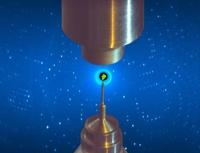Speaker
Description
We synthesized the non-ionic alternating amphiphilic polymers containing dicarboxylic acids as hydrophobic blocks and ethylene glycol oligomers as hydrophilic, and studied their properties. The lengths of the building blocks and their mass ratio allows tuning the amphiphilicity of the polymer chains in a wide range. As a consequence the polymers either dissolve in water as free chains or form micelles and gels.
We found that the water-soluble polymers with short hydrophobic and hydrophilic blocks can passively translocate through biological membranes. We studied translocation properties using Pulsed Field Gradient NMR and fluorescent microscopy. The results show that the translocation process consists of a relatively fast membrane saturation with the polymers and a slow release process. The translocation time varies from minutes to many hours depending on the polymer and lipid composition, polymer molecular weight and temperature. In order to understand the interaction of the polymers with lipid membrane and the translocation mechanism we performed Neutron Reflectometry and Small Angle Neutron Scattering experiments. The first measurements show that the polymers are located mainly in the hydrophobic membrane interior and cause thickness fluctuations of the tail region.
As the polymers do not show any damage of the membranes and are biodegradable, they might be interesting candidates for drug delivery applications.

